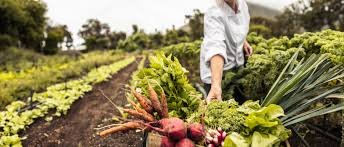Importance of Agriculture
Agriculture has always been the backbone of human civilization, playing a crucial role in feeding the global population, sustaining economies, and preserving the environment. In 2024, its importance is more pronounced than ever as the world faces new challenges and opportunities in the pursuit of sustainable development, food security, and environmental stewardship.

Agriculture has always been the backbone of human civilization, playing a crucial role in feeding the global population, sustaining economies, and preserving the environment. In 2024, its importance is more pronounced than ever as the world faces new challenges and opportunities in the pursuit of sustainable development, food security, and environmental stewardship.
Food Security and Nutrition
With the global population projected to reach 8.1 billion by 2024, ensuring food security remains a top priority. Agriculture is the primary source of food production, providing the essential nutrients required for a healthy and productive life. As dietary needs evolve and malnutrition persists in many parts of the world, innovative agricultural practices are crucial to producing diverse, nutritious, and sufficient food to meet the needs of all populations.
Economic Stability and Employment
Agriculture remains a significant contributor to the economy, particularly in developing nations where it often constitutes a large portion of the GDP. In 2024, agriculture continues to be a major source of employment, supporting the livelihoods of billions of people worldwide. By investing in modern agricultural techniques, infrastructure, and education, economies can enhance productivity, create jobs, and foster economic resilience.
Sustainability and Climate Change Mitigation
As the impacts of climate change intensify, agriculture plays a dual role as both a contributor to and a solution for environmental challenges. Sustainable agricultural practices, such as regenerative farming, agroforestry, and precision agriculture, are essential in reducing greenhouse gas emissions, conserving water, and preserving biodiversity. In 2024, the shift towards sustainable agriculture is critical in mitigating the effects of climate change while ensuring long-term food production.
Innovation and Technology
The agricultural sector in 2024 is undergoing a technological revolution. Advancements in digital agriculture, such as AI-driven analytics, drones, and IoT (Internet of Things) devices, are transforming farming practices. These technologies enhance efficiency, reduce waste, and enable farmers to make data-driven decisions. Biotechnology also plays a significant role in developing crop varieties that are more resilient to pests, diseases, and climate change, ensuring higher yields and food security.
Global Trade and Food Systems
Agriculture is at the heart of global trade, with many countries relying on the import and export of agricultural products. In 2024, the interconnectedness of food systems highlights the importance of agricultural trade in stabilizing food supplies and prices globally. However, it also underscores the need for fair trade practices and policies that support small-scale farmers and promote equitable access to markets.
Social and Cultural Significance
Beyond its economic and environmental roles, agriculture is deeply embedded in the social and cultural fabric of societies. It is a source of cultural identity, traditions, and community. In 2024, preserving and promoting traditional agricultural practices and knowledge is vital in maintaining cultural diversity and heritage, especially in indigenous and rural communities.
Health and Well-being
Agriculture directly impacts public health and well-being. The production of safe, high-quality food is essential for preventing foodborne illnesses and ensuring the well-being of populations. Furthermore, agriculture contributes to mental health by connecting people to nature and providing opportunities for physical activity through farming. In 2024, the emphasis on organic and sustainable farming practices also reflects a growing awareness of the link between agriculture, health, and the environment.
Environmental Conservation and Biodiversity
Agriculture is a key player in environmental conservation. In 2024, sustainable farming practices that protect soil health, water resources, and biodiversity are crucial in maintaining the balance of ecosystems. Agroecology, permaculture, and conservation agriculture are examples of approaches that integrate food production with environmental stewardship, promoting harmony between nature and agriculture.
Conclusion
The importance of agriculture in 2024 cannot be overstated. It is the foundation of food security, economic stability, and environmental sustainability. As the world navigates the complexities of climate change, technological advancements, and global trade, agriculture remains a vital sector that must adapt and innovate to meet the challenges and opportunities of the future. By prioritizing sustainable practices, investing in innovation, and supporting farmers, we can ensure that agriculture continues to play a pivotal role in creating a prosperous and resilient world for generations to come.
What's Your Reaction?





















